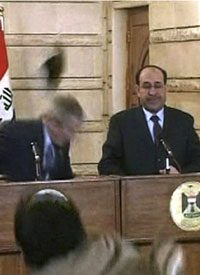
While in Baghdad, Bush also met with Prime Minister Nuri al-Maliki, and the two signed a security pact approved by Iraq’s parliament last month, officially known as the Strategic Framework Agreement and the Status of Forces Agreement. As the two signed the agreement, which schedules U.S. troops to leave Iraq by the end of 2011, Bush said: "The war is not over, but with the conclusion of these agreements… it is decisively on its way to being won."
The news conference held by Bush and Maliki to mark the occasion was interrupted by a bizarre incident which gained worldwide attention as a correspondent for Cairo-based al-Baghdadiya TV, Muntadar al-Zaidi, suddenly threw both of his shoes at President Bush. The incident was caught on videotape and Bush, who ducked as each shoe was propelled in his direction, was not struck.
The BBC reported that during the news conference Zaidi stood up and shouted "this is a goodbye kiss from the Iraqi people, dog," before throwing the first shoe. And as he threw the second shoe, Zaidi shouted: "This is for the widows and orphans and all those killed in Iraq."
Merely showing the soles of shoes to someone is a sign of disrespect in Arab culture and throwing the shows is a mark of utter contempt.
Fityan Mohammed, Al-Baghdadiya’s bureau chief told the Associated Press that he had no idea what prompted its correspondent to attack President Bush, although there are reports that Zaidi was once kidnapped and beaten by a militia.
"I am trying to reach Muntadar since the incident, but in vain," said Mohammed. "His phone is switched off." However, Al-Baghdadiya issued a statement that "Any measures against Muntadar will be considered the acts of a dictatorial regime."
A statement released by the Iraqi government said Zaidi’s actions had "harmed the reputation of Iraqi journalists and Iraqi journalism in general." An Iraqi official was quoted by the Associated Press as saying that Zaidi was being interrogated to determine if he had been paid to throw his shoes at President Bush.
Meanwhile, crowds began to gather in Baghdad’s Sadr City, in the southern city of Basra — a Shiite stronghold — and in the holy city of Najaf, where protesters threw shoes at a U.S. convoy.
Udai al-Zaidi, the reporter’s brother, told Reuters Television: "Thanks be to God, Muntazer’s act fills Iraqi hearts with pride, I’m sure many Iraqis want to do what Muntazer did. Muntazer used to say all the orphans whose fathers were killed are because of Bush."
Defense Secretary Robert Gates, who has been asked to stay on in his post under Barrack Obama, addressed U.S. troops at an airbase bear Baghdad on December 13, said that "the process of the drawdown" had begun and stated: "We are, I believe, in terms of the American commitment, in the endgame here in Iraq."
After leaving Iraq on December 15, President Bush made a second surprise stop as Air Force One flew under cover of darkness, lights extinguished, into Bagram Air Base near Kabul, Afghanistan. Bush addressed U.S. troops at the base and was then flown by Blackhawk helicopter to Kabul for a meeting with Afghan President Hamid Karzai.
At a joint news conference held with Karzai at the presidential palace, Agence France Presse reported that Bush predicted that fighting would continue for a long time in Afghanistan: "This is going to be a long struggle," said Bush. "Ideological struggles take time."
Bush asked rhetorically, "Are there difficult days ahead?" And then provided his answer: "Absolutely. But are the conditions a lot better today in Afghanistan than they were in 2001? Unquestionably, undoubtedly they’re better."
So much better, in fact, that General David McKiernan, the top commander of NATO forces in Afghanistan, has asked for more than 20,000 extra US soldiers to counter the rising level of violence in the country. The additional forces will increase the number of U.S. troops in Afghanistan to about 58,000. On December 11, Secretary of Defense Gates and General McKiernan said that there would be a "sustained commitment" of U.S. troops in Afghanistan for the next three to four years.
The president told reporters aboard Air Force One en route to Afghanistan: "You’ll see violence tick up. The degree of difficulty in Afghanistan is high, Nevertheless, the mission is essential."
Photo: AP Images



